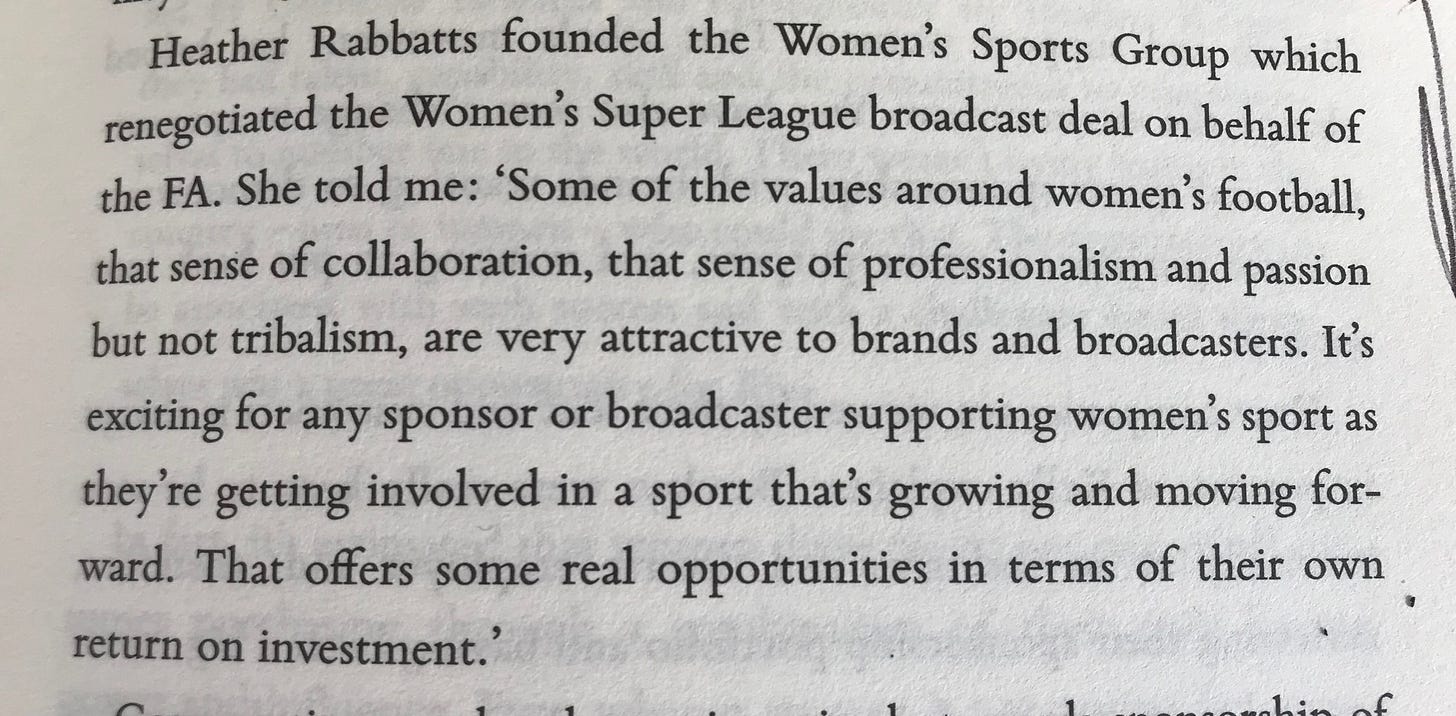Children are now doing the IOC's marketing; P/E v women’s sport utopias; The regulatory impulse; What Rick Parry told Tracey Crouch; Fan engagement is a euphemism for betting; Fjortoft revisited
The newsletter of the podcast
Join the thousands of people who subscribe to Unofficial Partner.
We publish two podcasts each week, on Tuesday and Friday.
These are deep conversations with smart people from inside and outside sport.
This newsletter is our way of picking up the threads, and is published every Thursday.
Our entire back catalogue of 180 sports business conversations are available free of charge here.
Each pod is available on Apple, Spotify, Google, Stitcher and every podcast app.
If you’re interested in collaborating with Unofficial Partner to create one-off podcasts or series, you can reach us by replying to this email.
This week’s UP newsletter is sponsored by our friends at the Professional Triathlete Organisation, who have a big new event coming up at the end of August. The Collins Cup has a $1.5million prize purse and is a reformatting of the sport along the lines of golf’s Ryder Cup. If you’d like to find out more, head here.
Don’t put your daughter on a skateboard Frankie Worthington is very nearly a great headline
In chasing Gen Z, the IOC has made a silly mistake.
Seeing 12 and 13 year olds on the podium isn’t inspirational, it’s borderline exploitation.
They are children not marketing assets. Once the Games is over, they will go back to being children, while the IOC’s marketing machine will encourage the use of their images in sponsor-seeking storylines that include phrases such as, ‘greater engagement with new audiences’.
It’s a bad decision, taken from a position of weakness.
But woe betide anyone seeking to promote skateboarding in the wrong way
The IOC is in a classic bind when it comes to its ageing demographic.
It’s a tricky business, engaging Gen Z from within a business model driven by Baby Boomer broadcast and sponsorship economics.
See what happened when Elaine Thomson-Herah, aka the fastest woman in the world, tried to use Instagram to send some love for the child skateboarders…



What if, rather than attempt to control social media, you let YouTube creators do what they want with all the media inventory that sprays off an event like the Olympics?
What if, you did away with things like TOP category exclusivity, rights protection and Rules 40 and 50?
Then you’d have something closer to the thought experiment that is Aphetor - The Creator Games.
Listen: Carsten Thode’s Big Idea (UP Pod #46)
Rick Parry and Footy-Twitter’s response to Rick Parry
This week’s podcast with Rick Parry, the EFL Chairman and former CEO of the Premier League and Adam Paker, from the Portas Consultancy.
The Tracey Crouch review was a big talking point.
Parry couldn’t have been clearer on what he said to he review.
Get rid of parachute payments and move to a more rational redistribution of Premier League media rights revenue, which would remove perverse incentives among Championship club owners.
Everything flows from redistribution in our view. What we need is fundamental redistribution and enhanced cost controls. We have decent cost controls in the EFL. We need to enhance them. We need to change them. Clubs are willing to do that. Once we have those two things, then we have 72 sustainable clubs almost overnight.
Fair to say it has provoked a big response on Twitter, particularly from various fan groups.
See Andy Holt’s thread below, which was the most considered and interesting. There were many, many others who took the line of slagging off Parry without making the effort to listen to what he was saying.


There’s something in the impulse toward regulation that interests me, the desire for control, or some sort of reckoning.
But by whom and regulating what? What are the limits of it, and do you trust Boris Johnson’s government to do what previous governments, sports administrations and the market have failed to do?
Often, the American model is cited, with it’s clean lines from top to bottom, and an all powerful Commissioner at the top overseeing the hot mess of team owners, closed leagues, salary caps, drafts and franchise valuations.
But the US market is so fundamentally different as to render the comparison futile.
We all love easy answers. When it comes to sorting out football, I’m just not sure there are any.
We don’t often talk about women and betting
Tomorrow’s podcast is with Sue Anstiss, who has written a good book on women’s sport. Listen to the conversation with Sue and my regular co-host Laura Weston here.
We were talking about the need to build team allegiances in netball, football and cricket.
My pet theory is that in men’s football and in US Major League sport, the phrase fan engagement is a euphemism for betting.
But betting doesn’t get mentioned much in women’s sport conversation.
This is odd when you think about it.
To build a sports audience today, in 2021, the dispassionate view would be that gambling is part of the jigsaw.
If you wanted to attract large numbers of people to follow netball, or WSL, or The Hundred, there’s a plausible argument to embed betting more centrally in to the product.
Look at what’s happening in the US market, where the sports books are using OTT and tech innovation to shift their role from sponsorship to full integration in to the product. (Note: We have a podcast coming up with Sportradar and LiveLike, on their new cutting-edge emBET collaboration).
The argument often made by supporters of private equity is that they will enable sport to grow quicker. For example, in the WSL’s case, this would move the sustainability runway closer than the current 2032 date referenced by Kelly Simmons in our podcast last month.
My bet (!) is that any private equity group seeking to invest in women’s sport will want the rights holder to put betting at the centre of the business model. This would build revenue quickly.
So, why is women and betting not a thing?
The obvious answer is that gambling comes with moral questions. Very, very valid and troubling ones.
Sue Anstiss articulated the anti-betting position: ‘I want to think we can be better than that’.
This is admirable and is a useful test of the brand purpose argument, that sports audiences will increasingly demand rights holders stand for something more than just excellence in putting on sports events.
But it creates a challenge for potential investors: Private equity isn’t famous for its utopian views on business.
I’m not sure if it helps or hinders growth if women’s sport is seen as morally superior to men’s?
See also: (Male) tribalism is a bit passé.
Interesting point from Heather Rabbatts, from Sue’s book below. Do brands and TV really not value tribalism? If it’s true, that’s big news.
UP Archive
A fun conversation with Norway’s greatest export: Jan Åge Fjortoft.
Enjoy the Unofficial Partner newsletter? Tell your friends
Subscribe to the Unofficial Partner podcast.
Help us game the Substack algorithm by liking this newsletter and spread the word on social media.
Follow @RichardGillis1 and @PaulPingles (aka the ill-judged Twitter handle of Sean Singleton, the UP co-founder).
Read over 100 gushing five star reviews for UP on Apple Podcasts - click the link to add yours.






